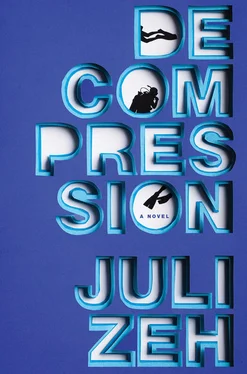When I heard steps on the stairs, I thought it was Theo, coming to apologize. Or in other words, to examine at close range the damage he’d caused. But it was Sven. My first impulse was to send him away. The last thing I needed was somebody making clumsy attempts to comfort me. But Sven was already blathering before he reached the deck. He came up to me, stared at my forehead, and talked. Laid his hands on my shoulders, shook me, and talked. At some point I realized he wasn’t trying to comfort me. Not even a little bit. It wasn’t about me at all; it was about his diving expedition. The fabulous shipwreck exploration. His private birthday celebration one hundred meters underwater. It couldn’t happen, he said, because Bernie and Dave, for some reason he didn’t understand, had pulled out. The worst-case scenario. He asked whether I’d be able to assist him. He wanted us to be his substitute crew, me and the old man. Of all people!
Out of sheer amazement, I gave him sensible answers. I said I thought it wasn’t a good idea. Neither Theo nor I had the necessary experience, I said; it would be better to postpone the expedition .
But a postponement was out of the question. The winter, the currents, the wind. All that planning. And his birthday. He’d been working weeks and months to prepare for this one day. He’d invested untold amounts of money. And I’d been steering ships since before I could walk, right? I told him what he knew better than anyone, namely that the wreck lay several kilometers off the coast, and that he’d be putting his life in the hands of his crew. But he didn’t give up. He said he trusted me more than he did the two Scottish assholes who had just double-crossed him. Was I going to leave him in the lurch too? And then once more, from the beginning: the planning, the currents, his birthday. Tomorrow morning or never. I had to help him. Absolutely had to. He begged me: Please, please, please. Like a little boy. Shining eyes, red cheeks .
While he talked like a waterfall, I wondered whether he understood what had just taken place at the table. Or whether it simply didn’t interest him. Could a man actually be so egocentric that he’d consider a canceled dive more important than the total emotional destruction of the woman he supposedly loves? I didn’t say anything else, I just listened. Such steadfast pigheadedness astounded me. It was like some elemental force .
Until what he was doing dawned on me. And it was so clever, so sensitive, so thoughtful and right, it almost brought tears to my eyes. He didn’t want the expedition for himself. He wanted it for me. He’d realized at once it wouldn’t be any use to talk about Lotte or Theo. Or about the fact that my shitty life lay in shitty ruins. He wanted to redirect my attention and give me a chance to concentrate on real things: water, wind, boat. Things he understands, things he knows will be good for me. He wanted me to f i ght, to be the person he needs, the one who must help him. Sven himself canceled Bernie. He sent him a text message and let him know he needed only the Aberdeen, without any crew. Because he wants to sail with me. It’s his way of reminding me of something I can do very well, though I do it far too seldom: I know how to keep a boat on course .
All at once I smelled the sea and felt the Dorset ’s slight movements. I was alive again. All the pain was still there, but so was joy. I lived toward Sven, as though love were a direction. I took him in my arms. The stream of his words dried up immediately. I said I’d come with him. It would be a fantastic expedition, I said .
He said, I need Theo too. I said, Then Theo’s coming with us. He said, Theo’s important. We can’t do it without Theo. I said, Don’t worry, he’ll come. Then Sven wanted to know if I could promise that. I promised. He made me repeat the promise. Both of us, Theo and I. Tomorrow morning at six, in front of the Casa Raya. Ready for action. Sven stressed every single word. Like we were plotting a bank robbery. I kissed him. He stroked my hair. I wasn’t interested in thinking about the future anymore. Not even about Saturday. Only about now and tomorrow morning. Then Sven said it was late. He told me to take a cab and go to bed. He’d bring Theo home. We all needed at least a few hours’ sleep .
The sleeping part’s hard. I’ve got so much to think about, so much I’d like to write about. But Sven’s right. We need sleep. I think I can hear his van driving up. The light has to be off when Theo comes in. I’ll stop now .
“Sweet,” Jola said, and jumped aboard.
The Aberdeen is a converted fishing cutter, nine meters long, with a small cabin, two single berths, and all-wood construction. Nineteen sixties diesel engine, seventy-five horsepower, six knots. Although it was still dark, Jola inspected the helm stand while I unloaded the steel cylinders from the van. The VW’s headlights illuminated the quay. We were the only people in sight. The Marina Rubicón was still asleep. Unlike Puerto Calero, this harbor contained no luxury yachts; instead there were little vacation vessels, family boats, small, trim cutters — a floating campground in the last minutes of nighttime peace. A narrow streak of dawn appeared behind the promontory.
“Only radar and radio?”
I handed her the bag with the portable devices: depth sounder, GPS, chartplotter. She gave a satisfied nod and started to set things up. I lugged aboard my dive suit, stage tanks, and chests with other accessories. Theo sat on a bench a little apart and dedicated himself to transpiring alcohol.
“Almost exactly four kilometers southwest of here? So about twenty-nine north, fourteen west?”
Jola was good. Very good. The wreck lay at latitude 28°50′33.8″ north, longitude 13°51′8″ west. I gave her the exact coordinates and felt myself relax. Jola was wearing jeans and a checkered shirt and moving about with great assurance, as if she sailed the Aberdeen on the Atlantic Ocean every day. I believed I could rely on her ability. Theo, staring off in another direction, lit his third cigarette.

I find that day difficult to describe. My memories aren’t like a coherent, linear film; they’re individual images, still shots, like a puzzle with half the pieces missing. At the same time, every single detail is probably important right now. Herr Fiedler, do you really think we’re interested in the horsepower of an old fishing cutter? Don’t you think we’d rather hear about the impression Frau von der Pahlen made on you on the morning of November 23, 2011? The allegations you’ve brought us are very grave, Herr Fiedler! Give us a chance to believe you! Was Frau von der Pahlen different from usual? Did she act despondent? Aggressive? Hysterical? Come, come, Herr Fiedler, you can surely offer us a few descriptive words. This cannot be so difficult!
But it is. Jola was always “different,” every day; with her, there was no “usual.” If I honestly ask myself whether anything struck me on that particular morning, whether I could have known or at least sensed what would happen in the next several hours, I must answer with a clear “No.” It’s possible I wasn’t paying sufficient attention. I might have been concentrating too hard on the upcoming dive. On going over my equipment, which I checked at least five more times. As far as I noticed, Jola acted neither despondent nor aggressive. Maybe a little too chirpy. Which, after the events on the Dorset , wouldn’t have surprised me — had it crossed my mind to give any thought to such matters. Above all, she struck me as being in a very good mood. She seemed to be looking forward to our adventure. It was obvious that the Aberdeen gave her great pleasure; it was as if she was finally in her true element. And I liked the way she looked in jeans and a work shirt. Even more, actually, than the way she’d looked in her evening dress.
Читать дальше













